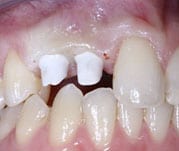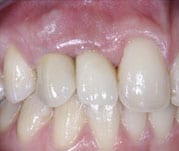
For many of our Belmont patients, an oral surgery they receive in our office – such as a tooth extraction or the placement of dental implants – is the only surgery they’ve ever had in their lives. As such, it’s understandable that they have questions about what to expect before and after their procedure.
Many of our Belmont oral surgery patients are curious if they need to fast before their procedure. They’ve heard of friends and family having to fast before having medical surgery, and they wonder if the same is true for a dental surgery. The answer is – it depends on your surgical plan.
When You Don’t Need to Fast
If you’re coming into our office for an oral surgery procedure, you won’t need to fast because the local anesthesia you’ll receive for the surgery doesn’t require it. In fact, our doctors encourage our Belmont patients having a tooth extraction, bone graft, dental implants placement, or other surgery to eat before their appointment, because the surgery may make it difficult to eat immediately afterwards. While some surgeries require our patients to be placed on a liquid diet for a temporary period of time, smoothies and milkshakes get old after a while. In this case, bon appetite before your appointment!
When You Do Need to Fast Before Your Surgery
Sometimes, our patients require more involved surgeries than we prefer to handle in our dental offices. This might include:
- Performing multiple surgeries in one surgical setting that will take several hours to complete
- Performing a necessary surgery on someone who is immunocompromised and needs to be in more of a hospital environment for their procedure
- Performing oral surgery on a Belmont patient who has dental anxiety, and desires IV sedation for their procedure
Our doctors don’t perform IV sedation for any procedures. When IV sedation is in the best interest of our patients, we coordinate with other dental providers and hospitals in our area so the IV sedation can take place in the safest environment possible.
IV sedation puts you completely asleep for your procedure, so you will be completely unaware of the surgery as it takes place. The sedatives used for IV sedation may also cause some patients to become nauseated or even vomit. While rare, there is a complication for IV sedation called aspirating. This is when a patient vomits and inhales the material into his or her lungs, which could cause serious complications.
While aspirating may sound scary, the good news is it can be entirely avoided. The patient going under sedation simply needs to refrain from eating or drinking anything 12 hours before their procedure. By having a completely empty stomach, you’ll have no stomach contents to vomit, and no material for your lungs to aspirate.
Learning More About Oral Surgery
If you’re a dental patient who’s been told you need a dental surgery, our doctors at Dental Restorative Group are happy to help. Whether you’ve been referred to our practice or are looking for an oral surgeon on your own, simply call us to schedule an appointment at (617) 489-1470.






